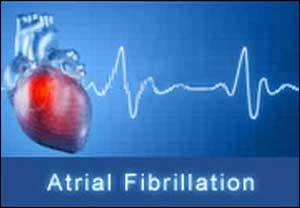- Home
- Editorial
- News
- Practice Guidelines
- Anesthesiology Guidelines
- Cancer Guidelines
- Cardiac Sciences Guidelines
- Critical Care Guidelines
- Dentistry Guidelines
- Dermatology Guidelines
- Diabetes and Endo Guidelines
- Diagnostics Guidelines
- ENT Guidelines
- Featured Practice Guidelines
- Gastroenterology Guidelines
- Geriatrics Guidelines
- Medicine Guidelines
- Nephrology Guidelines
- Neurosciences Guidelines
- Obs and Gynae Guidelines
- Ophthalmology Guidelines
- Orthopaedics Guidelines
- Paediatrics Guidelines
- Psychiatry Guidelines
- Pulmonology Guidelines
- Radiology Guidelines
- Surgery Guidelines
- Urology Guidelines
YES- Depression can lead to Irregular Heart Beats: ESC

According to a study published in the European Journal of Preventive Cardiology, a European Society of Cardiology (ESC) journal, Depression can lead to Irregular Heart Beats. Depressed people have an increased risk of atrial fibrillation for which medication was not responsible. The findings have been reported during Global AF Aware Week.
Depression is a common mental disorder. Globally, more than 300 million people of all ages suffer from depression. Depression is the leading cause of disability worldwide and is a major contributor to the overall global burden of disease. Atrial fibrillation is the most common heart rhythm disorder (arrhythmia). It causes 20-30% of all strokes and increases the risk of dying prematurely. One in four middle-aged adults in Europe and the US will develop atrial fibrillation.
Study author Morten Fenger-Grøn, senior statistician, Research Unit for General Practice, Aarhus University, Denmark, said: "It is common knowledge that there is a connection between the mind and the heart. Depression predicts the development of coronary artery disease and worsens its prognosis. Our study investigated whether depression is also linked with atrial fibrillation."
Atrial fibrillation is the most common heart rhythm disorder (arrhythmia). It causes 20-30% of all strokes and increases the risk of dying prematurely. One in four middle-aged adults in Europe and the US will develop atrial fibrillation. It is estimated that by 2030 there will be 14-17 million patients with atrial fibrillation in the European Union, with 120,000-215,000 new diagnoses each year. Signs of atrial fibrillation include palpitations, shortness of breath, tiredness, chest pain and dizziness.
Previous studies have found associations between depression and both more severe symptoms and higher mortality in atrial fibrillation patients. Antidepressants have been linked with some serious, but rare, heart rhythm disturbances, prompting the question of whether they might also raise the risk of atrial fibrillation.
This study investigated the association of depression, and antidepressant treatment, with the risk of developing atrial fibrillation. Filling a prescription for antidepressants for the first time was used as an indicator of depression.
The study included all 785,254 Danish citizens initiating antidepressant treatment from 2000 to 2013 and a 1:5 random sample of the Danish population matched on sex and birth month. The risk of atrial fibrillation was assessed after starting treatment and in the month before when it was assumed that patients were depressed but medically untreated.
Compared with the general population, patients taking antidepressants had a 3.18-fold higher risk of atrial fibrillation during the first month of treatment. The association gradually reduced thereafter, to 1.37-fold at 2-6 months, and 1.11-fold at 6-12 months.
Mr Fenger-Grøn said: "Filling a prescription for antidepressants, which we used as an indicator of depression, was associated with a three-fold greater risk of atrial fibrillation. The decrease with time could suggest that treatment may alleviate this risk."
The risk of atrial fibrillation risk was even higher in the month before starting antidepressants (7.65-fold). "This suggests that antidepressant medication itself is not associated with the development of atrial fibrillation," said Mr Fenger-Grøn. "If you are depressed, there is no reason to worry that taking drug treatment will cause atrial fibrillation."
Mr Fenger-Grøn noted that in the month before starting medication, the risk of atrial fibrillation was 7.65-fold from 30 to 15 days before, and 4.29-fold in the last 15 days before. He said: "In Denmark, it is not typical for doctors to prescribe antidepressants at the first appointment. Our findings indicate that the initial conversation with a doctor may start to ease depressive symptoms."
He added: "The message for patients who already have atrial fibrillation is that you do not need to be concerned about taking antidepressant medication if you need it. Look after your mental health because our study supports existing evidence that problems with the mind can be detrimental for the heart."
For more details click on the link: DOI: 10.1177/2047487318811184

Disclaimer: This site is primarily intended for healthcare professionals. Any content/information on this website does not replace the advice of medical and/or health professionals and should not be construed as medical/diagnostic advice/endorsement or prescription. Use of this site is subject to our terms of use, privacy policy, advertisement policy. © 2020 Minerva Medical Treatment Pvt Ltd